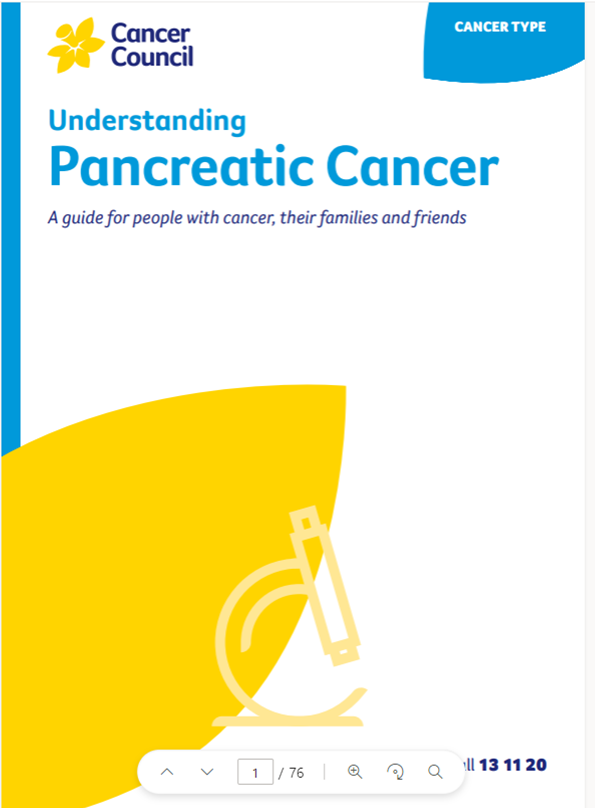- Home
- Pancreatic cancer
- Treatment to remove the cancer
Treatment to remove the cancer
This section gives an overview of treatments used for many stage 1–2 (early) pancreatic cancers and some stage 3 pancreatic cancers. Read more about the stages of pancreatic cancer.
Learn more about:
- Overview
- Treatments before or after surgery
- Where should you have treatment?
- Surgery
- What to expect after surgery
- What if the cancer returns?
Overview
The treatment options described in this section will be suitable for only about 1 in 5 people with pancreatic cancer, as most people are diagnosed at a later stage. Surgery to remove the cancer, in combination with chemotherapy and possibly radiation therapy, is generally the most effective treatment for early-stage pancreatic cancer. It is important that the surgery is done by a surgeon who is part of a multidisciplinary team in a specialist pancreatic cancer treatment centre.
Your health care team may talk to you about doing some exercises to help improve your fitness before surgery. This may be called prehabilitation. Ask your treatment team about prehabilitation and what exercises would be best for you.
Treatments before or after surgery
Your surgeon may recommend other treatments before surgery to shrink the tumour (called neoadjuvant therapies), or after surgery to destroy any remaining cancer cells (called adjuvant therapies). They may include:
- chemotherapy – the use of drugs to kill or slow the growth of cancer cells
- chemoradiation – chemotherapy combined with radiation therapy.
Where should you have treatment?
Treatment for pancreatic cancer is highly specialised. This is particularly the case for the surgery for early pancreatic cancer, such as the Whipple procedure.
There is strong evidence that outcomes are better when people have their treatment in a specialist centre that sees a lot of people with pancreatic cancer. These high-volume centres have multidisciplinary teams of health professionals experienced in treating pancreatic cancer.
Pancreatic cancer centres offer access to a wide range of treatment options – including treatments available only through clinical trials – but it may mean you need to travel away from home for treatment.
Sometimes the multidisciplinary team from a specialist centre will be able to advise your local specialist. You may find that you can visit the specialist centre to confirm the diagnosis and work out a treatment plan to have much of your treatment closer to your home.
To find a treatment centre that specialises in pancreatic cancer, talk to your GP.
→ READ MORE: Surgery to remove the cancer
If you live in a rural or regional area and have to travel a long way for appointments or treatment, you may be able to get financial assistance towards the cost of accommodation or travel. To check whether you are eligible or to apply for this assistance, speak to your GP or the hospital social worker, or call Cancer Council 13 11 20.
I asked the surgeon what caused it, and he said, ‘We don’t know, Phil’. He got me to focus on what had to be done and to just get on with it. It’s easy to say now that you need to get on the front foot and work with your treatment team, but the diagnosis is a terrific blow.
Phil
Podcast: Making Treatment Decisions
Listen to more episodes from our podcast for people affected by cancer
More resources
Prof Lorraine Chantrill, Honorary Clinical Professor, University of Wollongong, and Head of Department, Medical Oncology, Illawarra Shoalhaven Local Health District, NSW; Karen Baker, Consumer; Michelle Denham, 13 11 20 Consultant, Cancer Council WA; Prof Anthony J Gill, Surgical Pathologist, Royal North Shore Hospital and The University of Sydney, NSW; A/Prof Koroush Haghighi, Liver, Pancreas and Upper Gastrointestinal Surgeon, Prince of Wales and St Vincent’s Hospitals, NSW; Dr Meredith Johnston, Radiation Oncologist, Liverpool and Campbelltown Hospitals, NSW; Dr Brett Knowles, Hepato-Pancreato-Biliary and General Surgeon, Royal Melbourne Hospital, Peter MacCallum Cancer Centre, and St Vincent’s Hospital, VIC; Rachael Mackie, Upper GI – Clinical Nurse Consultant, Peter MacCallum Cancer Centre, VIC; Prof Jennifer Philip, Chair of Palliative Care, University of Melbourne, and Palliative Medicine Physician, St Vincent’s Hospital, Peter MacCallum Cancer Centre and Royal Melbourne Hospital, VIC; Lucy Pollerd, Social Worker, Peter MacCallum Cancer Centre, VIC; Rose Rocca, Senior Clinical Dietitian – Upper GI, Peter MacCallum Cancer Centre, VIC; Stefanie Simnadis, Clinical Dietitian, St John of God Subiaco Hospital, WA.
View the Cancer Council NSW editorial policy.
View all publications or call 13 11 20 for free printed copies.

